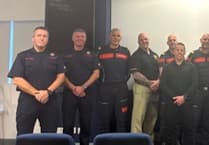Dyfed-Powys Police has claimed the top-spot in UK for average speed of answering 999 emergency calls.
Data published by police.uk shows that for the period January to August 2025 inclusive, Dyfed-Powys Police’s Force Communication Centre (FCC) was the fastest police contact centre in Wales for servicing 999 calls for help from the public.
Significant progress has been made over the last eighteen months with the introduction of new technology, enhanced ways of working, and the onboarding of 20 new team members, thanks to the investment made by the Police and Crime Commissioner, Dafydd Llywelyn.
The FCC continues to manage great demand for police services, with over 47,000 emergency calls received between January and September 2025. The team also received more than 117,000 non-emergency calls through the 101 phoneline, and a further 32,000 digital contacts via social media, the force website, and by email - all within the last nine months.
The dedicated team of FCC Operators and Supervisors haven’t just risen to the challenge, they have exceeded all expectations, ultimately providing a faster and more streamlined service to the public.
For the month of September 2025, Dyfed-Powys Police answered 999 calls in an average of 4.33 seconds, making Dyfed-Powys the fastest police force in the UK for that period. The target set nationally is 10 seconds with an average speed of answer in September at 7.71 seconds.
But this isn’t just about numbers. It’s about providing a vital service to those in desperate need of emergency help.
Karen Marshall, Force Communication Manager said: “I am very pleased that Dyfed-Powys Police is consistently able to quickly answer callers who are needing police help. Everyone in the FCC is committed to providing an excellent service to our communities and visitors to the Dyfed-Powys area.”
In January 2025, Dyfed-Powys Police and Crime Panel unanimously supported the Commissioner’s precept proposal for 2025/26, which increased the average band D property by 8.6%.
These additional funds have been invested into key areas of policing with the aim of bolstering frontline capabilities. Funding has been used to increase the number of frontline police officer positions, allowing experienced officers being released from desk-based investigations and other support roles to support neighbourhood and response policing.
Crucial funds were also allocated to the Force Communication Centre which has seen the introduction of a brand-new telephony system, omnicompetence training for the call operators and an increase in staffing numbers.
The new phone system routes calls to the most suitable operator based on their skillset. It also ring-fences two operators who are always free to take a 999 call; if they both take a call at the same time, it’ll ring fence a third operator.
Another enhanced feature is the callback function. This new system gives the caller the option to leave their phone number rather than wait in a queue. This means that if all the operators are engaged with answering 999 calls, they can call members of the public back at a convenient time, which is usually within around twenty minutes to an hour.
Perhaps one of the biggest shifts is the new omnicompetence training program, which equips FCC staff to become proficient in all aspects of contact handling, including call taking, dispatching officers to incidents, monitoring the digi-desk and operating CCTV.
Chris joined the FCC as a call handler in February 2024, and has since undergone the omnicompetence training.
Chris said: “Because we’re trained in all roles, it means we can flex our resource to meet the demand. If we’re experiencing high demand in a certain area, more staff can be allocated there to ensure wait times are kept low and the public are responded to quickly.
“Now that I’m also trained as a dispatcher, I have a better understanding of what officers need to know from that initial phone call. As a result, our call times are shorter. Not all calls we receive are police matters, and thanks to the training, we are able to signpost to other non-police services quicker, keeping our phone lines free for emergencies.”
Alongside these changes, the FCC has also welcomed 20 new members of staff to the team, adding resilience and capacity to service the needs of the public when it is needed most.
Police and Crime Commissioner Dafydd Llywelyn said: “I am extremely proud of our Force Communication Centre (FCC) for their continued dedication and professionalism. They play a vital role in ensuring that people in the Dyfed-Powys area get the help they need when they need it most.
“The additional investment made through last year’s precept has helped strengthen this service, supporting the introduction of new telephony systems and enhanced training for staff. It’s clear that this focus on improvement is paying off, with our communities benefitting from an even more responsive and efficient service.
“I’d like to thank all the staff who work in the Control Centre for their hard work and commitment, and I am confident that their continued efforts will maintain this high level of performance.”




Comments
This article has no comments yet. Be the first to leave a comment.